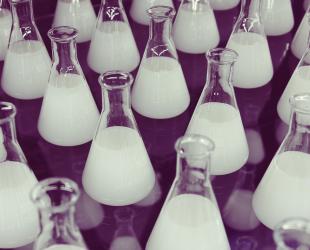Your breastmilk is perfect for your baby

Human breastmilk is a living substance, so complex that scientists are still trying to find everything that is in it.
Breastmilk varies from the beginning of the feed to the end of the feed, from day 1 to day 7 to day 30 and beyond. In short, your breastmilk is always exactly right for your baby!
Breastmilk contains all the nutrients and factors your baby needs for their health and development.
Breastmilk has factors which help protect your baby against infection and inflammation and help to develop their immune system and a healthy gut microbiome.
It contains many different living cells, for example white blood cells and stem cells. A young breastfed baby can consume up to 10 maternal white blood cells each day!
Breastmilk contains antibodies to protect baby's mucosal surfaces (eg inner linings of the mouth, nose, stomach and lungs). And there are cytokines, growth factors, oligosaccharides and hormones. These all play a significant role in a baby's health and development.
The oligosaccharides in breastmilk are different from any other mammal. They selectively encourage the growth of beneficial bacteria (probiotics). They also act as ‘decoys’ for pathogens, preventing them from causing illness in your baby.
The amazing thing about all these bioactive and anti-infective factors is that they work together. This means that giving a baby supplements with individual factors is unlikely to have the same effect.
Breastmilk is not sterile. It contains its own microbial community which likely helps to shape the development of your baby's gut microbiome.
Read more about how breastfeeding protects mum and baby.
Breastmilk is perfect for your baby, whatever their age.
The first milk that mums make is called colostrum. It is made in small amounts and is a rich source of immune protective factors and developmental factors. It’s perfect for whatever gestational age a baby is born. If your baby is premature, it will give them extra protection.
Breastmilk changes to meet the needs of your child. It continues to provide excellent nutrition, immune and other health and emotional benefits for whatever age your child is.
Breastmilk is perfect, however long a feed is.
Many mums worry because they’ve been told that their baby hasn't fed for long enough to get the fatty 'hindmilk'. But all breastmilk has some fat in it. Fat content of breastmilk naturally varies throughout a feed and throughout a day.
Early in a feed, your baby gets breastmilk that is lower in fat. Towards the end of the feed, they receive breastmilk that is higher in fat. Simply put, the emptier your breast is, the higher the fat content and vice versa. In the early part of the day, if you have very full breasts, fat content will be lower. Later in the day, as your breasts soften, the fat content will be higher.
If you follow your baby’s lead and breastfeed your baby whenever they are looking for the breast, your baby will get what they need.
You don’t need a perfect diet to breastfeed
In most cases you don’t have to worry about what you eat. The overall fat, protein and carbohydrate composition of breastmilk is fairly similar from mother to mother, even in different parts of the world. The breastmilk concentration of only a few nutrients can be affected by your diet. Even if you have a very limited diet, you will usually make quality breastmilk for your baby. You can eat a wide variety of healthy foods for your own health and wellbeing, but your diet has very little, if any, effect on your milk supply.
Occasionally a baby who has allergies or intolerances to certain foods may react through breastmilk to something that a mother eats. If you are concerned about this, seek advice from a health expert who has an interest in breastfeeding (lactation) or infant feeding as well as food allergy and sensitivity.
Breastmilk expressed in the day can be given at night and vice versa
Although a few components in breastmilk show changes in amounts in the day versus the night (that is they show a circadian rhythm), there is no evidence to suggest that giving breastmilk expressed in the day at night (or breastmilk expressed in the night during the day) causes any issues. It is however an area for which more research is needed, especially for premature babies.
Breastmilk is a dynamic, multi-faceted fluid containing nutrients and bioactive factors needed for infant health and development.
A lot of research into breastmilk composition has been done but there are more components of breastmilk still being identified.
© Australian Breastfeeding Association April 2022



